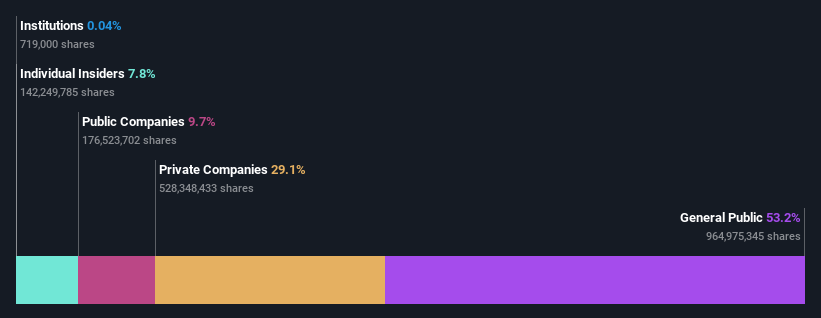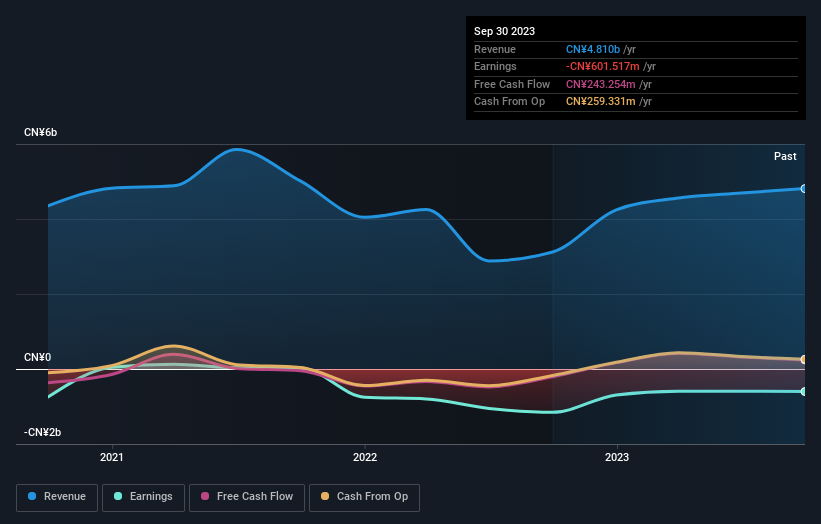Stock Analysis
- China
- /
- Construction
- /
- SZSE:002431
Palm Eco-Town Development Co., Ltd's (SZSE:002431) last week's 17% decline must have disappointed retail investors who have a significant stake

Key Insights
- Significant control over Palm Eco-Town Development by retail investors implies that the general public has more power to influence management and governance-related decisions
- The top 8 shareholders own 42% of the company
- Past performance of a company along with ownership data serve to give a strong idea about prospects for a business
A look at the shareholders of Palm Eco-Town Development Co., Ltd (SZSE:002431) can tell us which group is most powerful. The group holding the most number of shares in the company, around 53% to be precise, is retail investors. Put another way, the group faces the maximum upside potential (or downside risk).
As market cap fell to CN¥3.8b last week, retail investors would have faced the highest losses than any other shareholder groups of the company.
In the chart below, we zoom in on the different ownership groups of Palm Eco-Town Development.
Check out our latest analysis for Palm Eco-Town Development

What Does The Lack Of Institutional Ownership Tell Us About Palm Eco-Town Development?
Small companies that are not very actively traded often lack institutional investors, but it's less common to see large companies without them.
There are many reasons why a company might not have any institutions on the share registry. It may be hard for institutions to buy large amounts of shares, if liquidity (the amount of shares traded each day) is low. If the company has not needed to raise capital, institutions might lack the opportunity to build a position. On the other hand, it's always possible that professional investors are avoiding a company because they don't think it's the best place for their money. Palm Eco-Town Development's earnings and revenue track record (below) may not be compelling to institutional investors -- or they simply might not have looked at the business closely.

Hedge funds don't have many shares in Palm Eco-Town Development. Zhongyuan Yuzi Investment Holding Group Co., Ltd. is currently the company's largest shareholder with 29% of shares outstanding. Nanjing Chixia Development Co.,Ltd. is the second largest shareholder owning 9.7% of common stock, and Congxiao Lin holds about 1.4% of the company stock.
Our studies suggest that the top 8 shareholders collectively control less than half of the company's shares, meaning that the company's shares are widely disseminated and there is no dominant shareholder.
Researching institutional ownership is a good way to gauge and filter a stock's expected performance. The same can be achieved by studying analyst sentiments. We're not picking up on any analyst coverage of the stock at the moment, so the company is unlikely to be widely held.
Insider Ownership Of Palm Eco-Town Development
While the precise definition of an insider can be subjective, almost everyone considers board members to be insiders. Company management run the business, but the CEO will answer to the board, even if he or she is a member of it.
Insider ownership is positive when it signals leadership are thinking like the true owners of the company. However, high insider ownership can also give immense power to a small group within the company. This can be negative in some circumstances.
We can see that insiders own shares in Palm Eco-Town Development Co., Ltd. As individuals, the insiders collectively own CN¥302m worth of the CN¥3.8b company. This shows at least some alignment. You can click here to see if those insiders have been buying or selling.
General Public Ownership
The general public -- including retail investors -- own 53% of Palm Eco-Town Development. This size of ownership gives investors from the general public some collective power. They can and probably do influence decisions on executive compensation, dividend policies and proposed business acquisitions.
Private Company Ownership
We can see that Private Companies own 29%, of the shares on issue. It's hard to draw any conclusions from this fact alone, so its worth looking into who owns those private companies. Sometimes insiders or other related parties have an interest in shares in a public company through a separate private company.
Public Company Ownership
It appears to us that public companies own 9.7% of Palm Eco-Town Development. This may be a strategic interest and the two companies may have related business interests. It could be that they have de-merged. This holding is probably worth investigating further.
Next Steps:
It's always worth thinking about the different groups who own shares in a company. But to understand Palm Eco-Town Development better, we need to consider many other factors. For example, we've discovered 1 warning sign for Palm Eco-Town Development that you should be aware of before investing here.
Of course this may not be the best stock to buy. Therefore, you may wish to see our free collection of interesting prospects boasting favorable financials.
NB: Figures in this article are calculated using data from the last twelve months, which refer to the 12-month period ending on the last date of the month the financial statement is dated. This may not be consistent with full year annual report figures.
Valuation is complex, but we're helping make it simple.
Find out whether Palm Eco-Town Development is potentially over or undervalued by checking out our comprehensive analysis, which includes fair value estimates, risks and warnings, dividends, insider transactions and financial health.
View the Free AnalysisHave feedback on this article? Concerned about the content? Get in touch with us directly. Alternatively, email editorial-team (at) simplywallst.com.
This article by Simply Wall St is general in nature. We provide commentary based on historical data and analyst forecasts only using an unbiased methodology and our articles are not intended to be financial advice. It does not constitute a recommendation to buy or sell any stock, and does not take account of your objectives, or your financial situation. We aim to bring you long-term focused analysis driven by fundamental data. Note that our analysis may not factor in the latest price-sensitive company announcements or qualitative material. Simply Wall St has no position in any stocks mentioned.

Simply Wall St
About SZSE:002431
Palm Eco-Town Development
Palm Eco-Town Development Co., Ltd engages in the design, planning, construction, and operation of eco-towns in China.
Good value with mediocre balance sheet.
